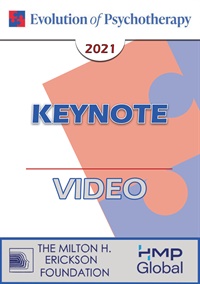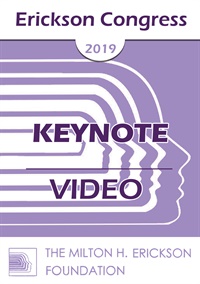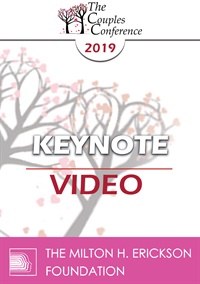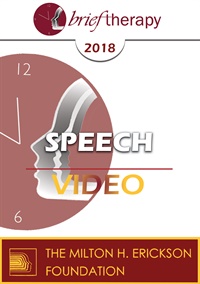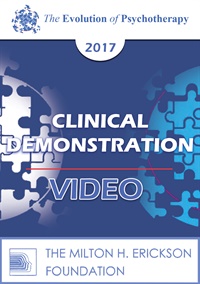- Average Rating:
- Not yet rated
- Topic Areas:
- Addiction | Attachment | Couples Therapy | Keynotes | Love | Relationships
- Categories:
- Evolution of Psychotherapy | Evolution of Psychotherapy 2021
- Faculty:
- Helen E. Fisher, PhD
- Course Levels:
- Master Degree or Higher in Health-Related Field
- Duration:
- 1 hour
- Format:
- Audio and Video
- Original Program Date:
- Dec 03, 2021
- Short Description:
- Is technology changing love? Why do you fall in love with one person rather than another? Why is the rejected brain primed for psychotherapy? How can you use neuroscience to keep love alive? And where are we headed in our digital age? Anthropologist and neuroscientist Dr. Helen Fisher uses her brain scanning work (fMRI) to discuss three basic brain systems that evolved for mating and reproduction--the sex drive, romantic love, and attachment; each plays a pivotal role in human health and happiness. And she uses her data on 50,000 single Americans to explain a new (and positive) trend in courtship, what she calls “slow love.” She then discusses her data on the biological foundations of human personality—specifically four basic styles of thinking and behaving that impact love relationships and all other social interactions.
- Price:
- $59.00 - Base Price

Credit available - Click Here for more information
- Average Rating:
- Not yet rated
- Topic Areas:
- Couples Therapy | IMAGO | Keynotes | Therapist Development
- Categories:
- Couples Conference | Couples Conference 2021 | Online Continuing Education | Pioneers in Couples and Family Therapy
- Faculty:
- Harville Hendrix, PhD | Helen LaKelly Hunt, PhD
- Course Levels:
- Master Degree or Higher in Health-Related Field
- Duration:
- 1 hour
- Format:
- Audio and Video
- Original Program Date:
- Jun 06, 2021
- Short Description:
- This keynote introduces Imago Relationship Therapy, emphasizing safe conversations and the shift to a relational paradigm. Key practices include structured dialogues—such as mirroring, validating, and empathic responses—to strengthen connection and address early childhood influences. The approach focuses on the “space between” partners, aiming to build conscious partnerships, improve relational skills, and support brain health through evidence-based methods.
- Price:
- $29.00 - Base Price

Credit available - Click Here for more information
- Average Rating:
- Not yet rated
- Topic Areas:
- Couples Therapy | Sex and Sexuality | Continuing Education | LGBTQ | Gender | Keynotes | Relationships
- Categories:
- Couples Conference | Couples Conference 2021 | Online Continuing Education
- Faculty:
- Joseph Winn, MSW, LICSW, CST-S
- Course Levels:
- Master Degree or Higher in Health-Related Field
- Duration:
- 1 Hour 2 Minutes
- Format:
- Audio and Video
- Original Program Date:
- Jun 06, 2021
- Short Description:
- This keynote will highlight core themes that are imperative for therapists to consider before working with relational systems that exist beyond the purview of heteronormativity. Specific topics will include becoming aware of ones sexological world views, understanding and working with sexual and relational health, and exploring what variant sexual, erotic and relational systems may offer heteronormative and monogamous couples in terms of increasing vulnerability, differentiation, and deepening relational attunement.
- Price:
- $29.00 - Base Price

Credit available - Click Here for more information
- Average Rating:
- Not yet rated
- Topic Areas:
- Couples Therapy | Mindfulness | Keynotes
- Categories:
- Couples Conference | Couples Conference 2021 | Online Continuing Education | Pioneers in Couples and Family Therapy
- Faculty:
- Ellyn Bader, PhD | Caroline S. Welch
- Course Levels:
- Master Degree or Higher in Health-Related Field
- Duration:
- 58 Minutes
- Format:
- Audio and Video
- Original Program Date:
- Jun 05, 2021
- Short Description:
- Exploration of how mindfulness can provide an accessible, useful tool in couples therapy, not only for the therapist, the two individuals, and their relationship, but also for the therapeutic process. Mindfulness can be practically applied through Caroline Welch’s 3Ps approach of Purpose, Pivoting, and Pacing to cultivate more resilience which is important to cultivate in couples therapy.
- Price:
- $29.00 - Base Price

Credit available - Click Here for more information
- Average Rating:
- Not yet rated
- Topic Areas:
- Couples Therapy | Love | Continuing Education | Keynotes
- Categories:
- Couples Conference | Couples Conference 2021 | Online Continuing Education | Pioneers in Couples and Family Therapy
- Faculty:
- Stan Tatkin, PsyD, MFT
- Course Levels:
- Master Degree or Higher in Health-Related Field
- Duration:
- 1 Hour 2 Minutes
- Format:
- Audio and Video
- Original Program Date:
- Jun 05, 2021
- Short Description:
- An exploration of how principle-based relationships—grounded in shared purpose, vision, and governance—can anchor couples amid stress, miscommunication, and human fallibility. Emphasizing co-regulation and mutual accountability, the session highlights how therapists can guide partners toward secure functioning while attending to broader ethical, social, and psychological dimensions of relational life.
- Price:
- $29.00 - Base Price
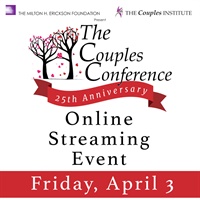
Credit available - Click Here for more information
- Average Rating:
- 28
- Topic Areas:
- Couples Therapy | Conflict | Developmental Therapy Model | IMAGO | Infidelity | LGBTQ | Relational Life Therapy Model (RLT) | Relationships | Sex and Sexuality
- Categories:
- Couples Conference | Couples Conference 2020 | Online Continuing Education
- Faculty:
- Ellyn Bader, PhD | Joseph Winn, MSW, LICSW, CST-S | Terry Real, LICSW | Harville Hendrix, PhD | Helen LaKelly Hunt, PhD | Martha Kauppi, MS MFT | Stan Tatkin, PsyD, MFT | William Doherty, PhD | ....
- Course Levels:
- Master Degree or Higher in Health-Related Field
- Duration:
- 4 Hours
- Format:
- Audio and Video
- Original Program Date:
- Apr 03, 2020
- Short Description:
- A streaming option in place of the Couples Conference 2020 4 hour event. This recording provides a comprehensive cross-section of a variety of approaches to couples therapy, including specific therapeutic models, discussions on sexual desire discrepancies, working with resistance in the therapy room and more.
- Price:
- $29.00 - Base Price
- Average Rating:
- Not yet rated
- Topic Areas:
- Keynotes | Psychotherapy | Generative Psychotherapy | Art and Creativity | Relationships
- Categories:
- Erickson Congress | Erickson Congress 2019
- Faculty:
- Robert Dilts, BA
- Course Levels:
- Master Degree or Higher in Health-Related Field
- Duration:
- 1 Hour 4 Minutes
- Format:
- Audio and Video
- Original Program Date:
- Dec 13, 2019
- Short Description:
- The core focus in Generative Change is creativity: How do you create a positive relationship with others and yourself—your body, your past, your future, your wounds, and your gifts? To accomplish this, a person’s state of consciousness is the difference that makes the difference. Generative Change work involves building the generative states, for yourself and others, needed to make significant change. It then focuses on how to maintain these states in order to reach meaningful goals and transform challenging obstacles. This presentation will explore how the six steps of Generative Change may be applied to Psychotherapy.
- Price:
-
Sale is $29.00
price reduced from Base Price - $59.00

- Average Rating:
- Not yet rated
- Topic Areas:
- Short Courses | Trauma | Awareness Integration Model | Relationships
- Categories:
- Erickson Congress | Erickson Congress 2019
- Faculty:
- Foojan Zeine, Psy.D., MFT
- Duration:
- 1 Hour 28 Minutes
- Format:
- Audio Only
- Original Program Date:
- Dec 12, 2019
- Short Description:
- The effect of Traumas can persist throughout a person's lifespan and across different areas such as work, finances, intimate relationship, sexuality, relationship with body, and people at large. Beside building resiliency to reenter life's day to day activities, releasing of many beliefs that get created at the time of the trauma about the self and the world is necessary for the traumatic effect and impact to move from destructiveness to constructing life.
- Price:
- $15.00 - Base Price

- Average Rating:
- Not yet rated
- Topic Areas:
- Short Courses | Relationships | Ericksonian Hypnosis and Therapy Techniques | Therapeutic Relationship
- Categories:
- Erickson Congress | Erickson Congress 2019
- Faculty:
- Kevin Hall, MSc
- Duration:
- 1 Hour 26 Minutes
- Format:
- Audio Only
- Original Program Date:
- Dec 12, 2019
- Short Description:
- Warmth is essential to life itself and we have therefore been attracted to it since the beginning of time. Conversely cold, the absence of warmth is associated with conditions of a more precarious nature such as scarcity, isolation or even demise. The association also seems to hold true for human relationships: people who are able to signify the concept of warmth in the way they relate to others appear socially competent, trustworthy and charismatic. The presence of warmth positively enhances attachment experiences and therefore moments of significant emotional connection.
- Price:
- $15.00 - Base Price

- Average Rating:
- Not yet rated
- Topic Areas:
- Short Courses | Community | Ericksonian Hypnosis and Therapy Techniques | Relationships
- Categories:
- Erickson Congress | Erickson Congress 2019
- Faculty:
- Gabrielle Peacock, MBBS
- Duration:
- 1 Hour 25 Minutes
- Format:
- Audio Only
- Original Program Date:
- Dec 12, 2019
- Short Description:
- Dr Erickson’s work with individuals, couples and families has been well explored, but what is often overlooked is his skill in information gathering and interventions that connected a client to their community. Communities are not what they were in his time and attempts to do this without first building a healing community can be fraught.
- Price:
- $15.00 - Base Price
Credit available - Click Here for more information
- Average Rating:
- Not yet rated
- Topic Areas:
- Keynotes | Neuroscience | Couples Therapy
- Bundle(s):
- CC19 Main Conference Video Bundle | CC19 Individual Selections
- Categories:
- Couples Conference | Couples Conference 2019 | Online Continuing Education | Pioneers in Couples and Family Therapy
- Faculty:
- Stan Tatkin, PsyD, MFT
- Course Levels:
- Master Degree or Higher in Health-Related Field
- Duration:
- 59:40
- Format:
- Audio and Video
- Original Program Date:
- Apr 14, 2019
- Short Description:
- This keynote explores the neurobiology of relational ethics, asking why partners sometimes act against their own or each other’s best interest. Tatkin examines how brain systems governing threat, stress, and reward influence moral behavior, and urges therapists to help couples co-create principles like fairness, transparency, and mutual care—shifting from reactive habits to secure, value-driven relating.
- Price:
-
Sale is $29.00
price reduced from Base Price - $59.00

Credit available - Click Here for more information
- Average Rating:
- Not yet rated
- Topic Areas:
- Workshops | Couples Therapy | Relational Life Therapy Model (RLT)
- Bundle(s):
- CC19 Main Conference Audio Bundle | CC19 Individual Selections
- Categories:
- Couples Conference | Couples Conference 2019 | Online Continuing Education | Pioneers in Couples and Family Therapy
- Faculty:
- Terry Real, LICSW
- Duration:
- 1:10:29
- Format:
- Audio Only
- Original Program Date:
- Apr 14, 2019
- Short Description:
- This workshop covers phase two of Relational Life Therapy, focusing on Family of Origin and Inner Child Work. It examines how childhood experiences shape each partner’s relational stance and the couple’s dynamic. Key tools include the Relationship Grid, which maps boundaries and self-esteem across four quadrants. The session addresses the impact of patriarchy, grandiosity, and shame, and offers strategies for building healthy self-esteem, managing contempt, and restoring relational balance.
- Price:
- $15.00 - Base Price

Credit available - Click Here for more information
- Average Rating:
- Not yet rated
- Topic Areas:
- Workshops | Couples Therapy | Gottman Method | Conflict | Relationships | Avoidant
- Bundle(s):
- CC19 Main Conference Audio Bundle | CC19 Individual Selections
- Categories:
- Couples Conference | Couples Conference 2019 | Online Continuing Education
- Faculty:
- Carrie Cole, M.Ed, LPC | Donald Cole, DMIN, LPC, LMFT
- Duration:
- 1:19:09
- Format:
- Audio Only
- Original Program Date:
- Apr 12, 2019
- Short Description:
- Particular attention will be given to working with couples displaying two patterns of dysfunction: escalation and avoidance.
- Price:
- $15.00 - Base Price
Credit available - Click Here for more information
- Average Rating:
- Not yet rated
- Topic Areas:
- Speeches | Relationships | Trauma | Continuing Education | Brief Therapy | Intimacy
- Categories:
- Brief Therapy Conference | Brief Therapy Conference 2018 | Online Continuing Education
- Faculty:
- Laura Brown, PhD
- Course Levels:
- Master Degree or Higher in Health-Related Field
- Duration:
- 1:03:11
- Format:
- Audio and Video
- Original Program Date:
- Dec 08, 2018
- Short Description:
- BT18 Speech 14 - Helping Trauma Survivors to Have the Relationships They Deserve - Laura Brown, PhD Survivors of complex childhood trauma --systemic abuse, neglect, and disrupted attachment schemata -- enter adulthood with internal working models of relationship that often lead them into difficult and painful connections with others. I will address the specific challenges in empowering these survivors to stop "paying the price of admission" to intimacy, and discuss how therapists can find effective strategies for addressing pre-verbal and early verbal core beliefs about self, being lovable, and being safe in relationships.
- Price:
-
Sale is $29.00
price reduced from Base Price - $59.00
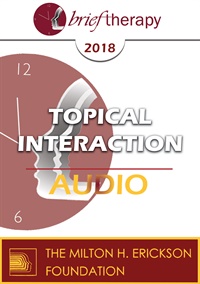
- Average Rating:
- Not yet rated
- Topic Areas:
- Topical Interactions | Feedback Informed Treatment (FIT) | Tailoring | Relationships | Therapeutic Relationship | Therapist Development
- Categories:
- Brief Therapy Conference | Brief Therapy Conference 2018
- Faculty:
- Scott Miller, PhD
- Duration:
- 57:17
- Format:
- Audio Only
- Original Program Date:
- Dec 08, 2018
- Short Description:
- Available evidence indicates that the effectiveness of psychotherapy has not improved despite 100 years of theorizing and research. What would help? Not learning a new model of therapy or the “latest” so-called “evidence-based” treatment approach. A simple, valid, and reliable alternative exists for maximizing the effectiveness and efficiency of treatment based on using ongoing feedback to empirically tailor services to the individual client needs and characteristics. Research from multiple randomized clinical trials documents that this simple, transtheoretical approach as much as doubles the effectiveness of treatment while simultaneously reducing costs, drop-out rates and deterioration. At this "Topical Interaction," participants will have a chance to address any practical issues, questions or challenges associated with incorporating outcome and alliance measures into their practice.
- Price:
- $15.00 - Base Price

- Average Rating:
- Not yet rated
- Topic Areas:
- Workshops | Brief Therapy | Generative Psychotherapy | Psychotherapy | Relationships | Therapist Development
- Categories:
- Brief Therapy Conference | Brief Therapy Conference 2018
- Faculty:
- Robert Dilts, BA
- Duration:
- 2:01:29
- Format:
- Audio Only
- Original Program Date:
- Dec 07, 2018
- Short Description:
- BT18 Workshop 14 - Applying Principles of Generative Coaching to Brief Therapy - Robert Dilts The core focus in Generative Coaching is creativity: How do you create a successful and meaningful work life? How do you create great personal relationships? How do you develop a great relationship with yourself—your body, your past, your future, your wounds, and your gifts? Generative change means creating something beyond what currently exists, whether in personal or professional life. It is not merely a cosmetic change, but a contextual shift that allows new levels of performance. Generative Coaching focuses on how to build the generative states needed to produce change and on how to maintain these states in order transform the obstacles and barriers that will inevitably arise.
- Price:
- $15.00 - Base Price

- Average Rating:
- Not yet rated
- Topic Areas:
- Short Courses | Humor | Psychotherapy | Brief Therapy | Relationships
- Categories:
- Brief Therapy Conference | Brief Therapy Conference 2018
- Faculty:
- Steven Sultanoff, Psychologist
- Duration:
- 1:18:02
- Format:
- Audio Only
- Original Program Date:
- Dec 06, 2018
- Short Description:
- Integrating therapeutic humor into psychotherapy is more than simply using humor with clients. This presentation will explore how and why integrating humor into clinical practice can be effective as well as assist clinicians to use humor with clinical awareness. Participants will learn a model of clinical humor that provides a foundation for the use of humor in psychotherapy and discover how humor (when purposely chosen as a clinical intervention) can be used as a relationship enhancing intervention, as well as a diagnostic and treatment tool.
- Price:
- $15.00 - Base Price

- Average Rating:
- Not yet rated
- Topic Areas:
- Emotionally Focused Therapy (EFT) | Workshops | Attachment | Couples Therapy | Relationships
- Categories:
- Couples Conference | Couples Conference 2018
- Faculty:
- Sam Jinich, PhD
- Duration:
- 1:16:10
- Format:
- Audio Only
- Original Program Date:
- May 05, 2018
- Short Description:
- Secure attachment offers us a potent sense of safety and a way to maintain equilibrium in the presence of danger or threat. These bonds allow us to tolerate and cope with our human frailty. The love one person feels from another has an enormous effect on them, both physically and emotionally. One of the goals of EFT is to help partners see how they are both caught in a recurring pattern of emotional disconnection, triggering each other into aggressively demanding a response or freezing up and sh
- Price:
- $15.00 - Base Price

- Average Rating:
- Not yet rated
- Topic Areas:
- Workshops | Couples Therapy | Communication | Art and Creativity
- Categories:
- Couples Conference | Couples Conference 2018 | Pioneers in Couples and Family Therapy
- Faculty:
- Harville Hendrix, PhD | Helen LaKelly Hunt, PhD
- Duration:
- 1:27:55
- Format:
- Audio Only
- Original Program Date:
- May 05, 2018
- Short Description:
- This workshop highlights the shift from individualism to a relational model in couples work, emphasizing the importance of curiosity, wonder, and connection. Key concepts discussed include the “space between” partners, the Zero Negativity Pledge, and the Steps to Wonder process. The framework presented aims to reduce conflict, enhance empathy, and help couples experience greater relational vitality.
- Price:
- $15.00 - Base Price

- Average Rating:
- Not yet rated
- Topic Areas:
- Workshops | Multicultural | Couples Therapy | Relationships | Polyamory
- Categories:
- Couples Conference | Couples Conference 2018
- Faculty:
- Martha Kauppi, MS MFT
- Duration:
- 1:51:58
- Format:
- Audio Only
- Original Program Date:
- May 05, 2018
- Short Description:
- Are you ready to hear your favorite long-term couple client tell you they are fighting because one of them is interested in exploring polyamory and the other is not? Would you choose to work with a couple who told you on the phone they live and love with 2 other people and some tensions are arising? Many people are exploring consensually non-monogamous relationships, and as a result, related issues are showing up in therapy rooms everywhere. This workshop will debunk myths, distinguish between n
- Price:
- $15.00 - Base Price

- Average Rating:
- Not yet rated
- Topic Areas:
- Couples Therapy | Workshops | Relational Life Therapy Model (RLT)
- Categories:
- Couples Conference | Couples Conference 2018 | Pioneers in Couples and Family Therapy
- Faculty:
- Terry Real, LICSW
- Duration:
- 58:30
- Format:
- Audio Only
- Original Program Date:
- May 04, 2018
- Short Description:
- This workshop is on Relational Life Therapy (RLT), a model designed to help clients move beyond shame and grandiosity to build healthier relationships. The speaker shares techniques for confronting dysfunctional behaviors, exploring family-of-origin patterns, and teaching practical relational skills. A case study illustrates how leverage, accountability, and skill-building can shift even high-conflict couples toward repair and responsibility.
- Price:
- $15.00 - Base Price

- Average Rating:
- Not yet rated
- Topic Areas:
- Workshops | Anxiety | Couples Therapy | IMAGO
- Categories:
- Couples Conference | Couples Conference 2018 | Pioneers in Couples and Family Therapy
- Faculty:
- Harville Hendrix, PhD | Helen LaKelly Hunt, PhD
- Duration:
- 1:47:37
- Format:
- Audio Only
- Original Program Date:
- May 04, 2018
- Short Description:
- This workshop focuses on building safety and connection in relationships using Imago therapy. Participants practice mirroring, validation, and sharing childhood experiences to better understand unmet needs. Key concepts include emotional symbiosis, the “space between” partners, and the dynamic between “hailstorm” and “turtle” personalities. Emphasis is placed on empathy, mutual healing, and the impact of early experiences on adult relationships.
- Price:
- $15.00 - Base Price
Credit available - Click Here for more information
- Average Rating:
- Not yet rated
- Topic Areas:
- Clinical Demonstrations | Couples Therapy | Intimacy | Sex and Sexuality | Relationships
- Bundle(s):
- Learning Track - Couples Starter Kit
- Categories:
- Evolution of Psychotherapy | Evolution of Psychotherapy 2017 | Online Continuing Education
- Faculty:
- Esther Perel, MA, LMFT
- Course Levels:
- Master Degree or Higher in Health-Related Field
- Duration:
- 52 Minutes
- Format:
- Audio and Video
- Original Program Date:
- Dec 16, 2017
- Short Description:
- Through podcasts and experiential exercises we will demonstrate clinical work around sexuality and intimacy with couples. Educational Objectives: Identify common blocks to eroticism including the fear of abandonment or entrapment, as well as how our emotional history shapes our erotic blueprint. Describe three strategies to help couples cultivate eroticism and bring a greater sense of aliveness to their relationship.
- Price:
-
Sale is $29.00
price reduced from Base Price - $59.00
Credit available - Click Here for more information
- Average Rating:
- Not yet rated
- Topic Areas:
- Speeches | Gender | Femininity | Masculinity | Relationships
- Categories:
- Evolution of Psychotherapy | Evolution of Psychotherapy 2017 | Online Continuing Education
- Faculty:
- Marilyn Yalom, PhD
- Course Levels:
- Master Degree or Higher in Health-Related Field
- Duration:
- 1:00:05
- Format:
- Audio and Video
- Original Program Date:
- Dec 15, 2017
- Short Description:
- The prominence of women as friends would have surprised people living in the distant past and would still surprise people in certain parts of the world, where only male friendship is prized. Yet, if you ask Americans today whether men or women have more friends, the answer is likely to be women. I shall examine the ingredients that seem basic to women’s friendships and suggest ways in which friendships between women (and between women and men) may be the saving grace in our present lives. I shall also examine the concept of friendship more generally as it has been understood in the western tradition since Aristotle. What are the benefits of friendship? Is it possible to live well without friends? What can women learn from male friendships and men learn from female friendships?
- Price:
-
Sale is $29.00
price reduced from Base Price - $59.00
Credit available - Click Here for more information
- Average Rating:
- Not yet rated
- Topic Areas:
- Speeches | Psychotherapy | Relationships | Therapist Development
- Bundle(s):
- Learning Track - EP17 Psychotherapy Stream
- Categories:
- Evolution of Psychotherapy | Evolution of Psychotherapy 2017 | Evolution of Psychotherapy Psychotherapy Learning Track | Online Continuing Education
- Faculty:
- Esther Perel, MA, LMFT
- Course Levels:
- Master Degree or Higher in Health-Related Field
- Duration:
- 53:45
- Format:
- Audio and Video
- Original Program Date:
- Dec 15, 2017
- Short Description:
- In her new Audible original audio series: Where Should We Begin, Esther Perel invites the listener into the raw intimate space of real anonymous couples who are participating in unscripted counseling sessions. In opening the closed doors of psychotherapy, she stands to redefine not only the boundaries of therapy, but also the communal nature of healing. The project raises some timely questions: If one of therapy's aims is to create a space for meaningful, challenging and authentic conversations between partners, can it broaden its aim and address relationships in today’s complex world in general. Can it serve to strengthen and improve human connection in society at large? What does therapy offer that differs from coaching? Where do thought leaders and psychotherapists intersect?
- Price:
-
Sale is $29.00
price reduced from Base Price - $59.00


